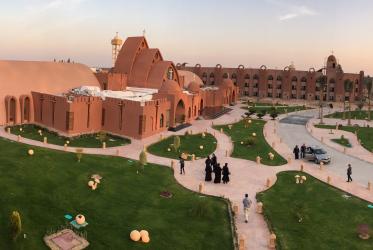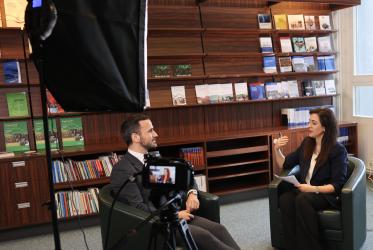MESSAGE FROM THE PLENARY COMMISSIONOF FAITH AND ORDER
Moshi, Tanzania, August 1996
The members of the Faith and Order Plenary Commission of the World Council of Churches assembled in Moshi, Tanzania, August 10-24 1996, send greetings to our brothers and sisters in all the churches and in all parts of the world. The Faith and Order Commission comprises over 120 members, drawn from among the member churches of the WCC and from the Roman Catholic Church, Pentecostals and Seventh Day Adventists. At the end of our meeting we wish to share some of its fruits with you.
The fact that our meeting took place in Africa made more relevant many critical issues which unfortunately are also found in other parts of the world: the stark poverty of the vast majority of the people, while the riches of the continent are drained away through the international debt; the horrific violence of ethnic conflicts, like those of Rwanda and Burundi, stimulated by economic interests; the threat to cultural identity and values from a growing individualism that sharpens social fragmentation.
At the same time we were privileged to get a glimpse of the gift of our African context: the profound sense of community, expressed in the Tanzanian concept of Utu; the joyous spirit manifested in songs, dance, hospitality in a growing and vital Christianity; the solidarity and collaboration among churches and between churches and government, in a concern for peace and in caring for refugees. In all these and in many other actions and attitudes, we hear a call to unity which embraces the whole of humankind.
As this century draws to a close, we as churches committed to the ecumenical movement, are invited to evaluate our achievements and shortcomings in the quest for Christian unity. Our task as the Plenary Commission of Faith and Order was undertaken within this context. As we dealt with specific studies we became conscious of the progress made and convergence reached in many fields, but also of the difficulties that are preventing us from moving ahead. We affirm our commitment to the goal of visible Christian unity for we plainly trust in the love of God that brought us together and which we experienced in the blessing of mutual encounter, in dialogue and in prayer. At the same time however we are aware of the tensions created among us by our different ecclesiologies, our diverse appreciations of the social, economic and political realities of the world and their significance for our theological vision, and our various ways of doing theology, related to ecclesial traditions and/or cultural contexts.
Nevertheless we are committed to continue working on the themes that are central to our task. We wish to intensify our work on worship because it is through worship that we best appropriate the unity that we have so far reached by God's grace. Further, we need to continue our studies on the nature and mission of the church as well as to assess their relationship to ethical and hermeneutical questions. We reaffirm our commitment to seek together the full visible unity of the church believing the primary purpose is indeed the heartbeat of the World Council of Churches. We look with hope to the provisional results of our efforts confident that through honest dialogue and fidelity to the word of God, in a renewed spirituality of commitment, and, above all, under the guidance of the Holy Spirit, we will be able to grow and be built in unity and communion.
Our churches are divided across confessional and denominational lines, but also because of tensions created by political options, ethical issues and social and economic inequalities. As we enter a new millennium these challenges require a new approach to the quest for the unity of the church. Only with realism and humility will we be able to face the coming task. The wounds to be healed, inflicted on one another through history, as well as the present state of human relations which endanger the lives of many and even the integrity of the created world, demand an attitude of repentance and a will for repairment that can only be inspired by the gracious gift of God.
Our experiences of unity and our desire for full communion, inspired in us by the presence and action of the Triune God, allow us to live in freedom and diversity in these times of grief and uncertainty. "We are afflicted in every way but not crushed; perplexed but not driven to despair; persecuted but not forsaken, struck down but not destroyed, always carrying in the body the death of Jesus so that the life of Jesus may also be made visible in our bodies". (2 Cor. 4: 8-9) With that mission and in that hope we ask the churches to continue in prayer and commitment to unity. God's will for the church and for the whole of creation is not in vain, and God's continuous love renews in us the strength and desire to live in a growing koinonia with the Trinity and with one another.



